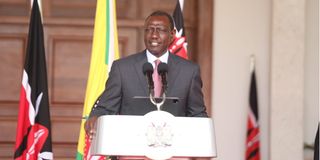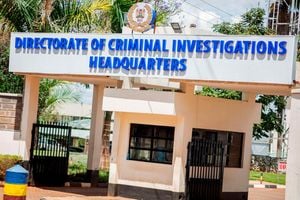
President William Ruto addresses the Nation from State House, Nairobi.
President William Ruto has announced a radical plan to slay the dragon of corruption, proposing that trials for graft and economic crimes should take no more than six months.
The latest development comes after the president was forced into action by deadly anti-government protests demanding an end to the wanton theft of public resources and the extravagant lifestyles of public servants.
The youth are frustrated with the head of state for failing to deliver on his election promises to tackle corruption.
It is estimated that the government loses 30 per cent of its annual budget to corruption, leading to persistent budget deficits and borrowing to fund government operations and development programmes.
While sacking his cabinet on July 11, the president showed his willingness to slay the dragon of corruption.
Speaking at State House on Wednesday, President Ruto went a step further, saying he will propose amendments to several corruption-related laws to speed up the investigation and prosecution of corruption and economic crimes cases.
Dr Ruto cited the Evidence Act and the Criminal Procedure Code as some of the laws that will be amended to help in the fight against graft, which according to various reports, costs taxpayers at least Sh1.6 billion daily.
He said the amendments are aimed at speeding up the investigation and prosecution of corruption and economic crimes cases, providing for their conclusion within six months.
In 2016, former Ethics and Anti-Corruption Commission Chairman Philip Kinisu announced that about Sh600 billion was lost to corruption every year, equivalent to Sh1.6 billion a day. Mr Kinisu said at the time that a third of Kenya's budget was routinely stolen from the public sector.
For instance, in the financial year ending June 2018, the national government could not account for about Sh514.6 billion, equivalent to Sh1.4 billion per day, while in the previous financial year, the unaccounted amount was Sh381.7 billion, equivalent to Sh1 billion per day.
Furthermore, President Ruto said his administration will propose amendments to the Witness Protection Act to overhaul the legal and institutional framework to protect and incentivise whistleblowers and strengthen witness protection.
He said the move aims to make it easier and safer for citizens to come forward and report corruption and other criminal activities.
“I want to give the people of Kenya an assurance that their government listens to them and that, for the last month, I have led the government in engaging with and listening to citizens from all walks of life as they expressed themselves in different forums and on various platforms,” said President Ruto.
“What has emerged as the foremost national concern requiring urgent and decisive action is the vexing matter of corruption and the non-negotiable desire for accountable leadership and integrity in governance. I have this to say to Kenyans: I have heard you clearly,” he added.
The President urged investigative agencies to provide a timeframe for the completion of active corruption cases and clearly communicate this to the public.
“While fully respecting the independence of the national justice, law and order institutions, and pursuant to a commitment to consult and collaborate in leveraging their institutional capabilities in effective, expeditious and conclusive investigations in respect of all active cases,” he said.
A total of 77 high-impact corruption cases involving more than Sh157 billion in public funds were registered in court between 2018 and the first six months of 2020, according to a report by the Office of the Director of Public Prosecutions.
In 2019 alone, 26 corruption graft cases involving top government officials worth Sh140.2 billion were pending in court. This amount represented about five per cent of the 2018/2019 national budget.
In the first six months (January-June) of 2020, the government lost Sh1.24 billion to corrupt state and public officers.
Bribery, extortion and kickbacks are some of the major forms of corruption in public service delivery and production through irregular procurement and award of government contracts.
In response, President Ruto announced that he would propose amendments to the Public Finance Management Act and the Public Procurement and Disposal Act within 90 days to overhaul the institutional and operational framework for public procurement, with a view to implementing a digital infrastructure within six months.
Also read: To get investments, end corruption
He noted that public procurement has been identified as an epicentre of corruption, conflict of interest and abuse of office.
“The aim of these measures is to provide an open and transparent public procurement platform which gives open, real-time and end-to-end public visibility of public procurement from advertisement to award of contract,” he said.
Further, Dr Ruto said he has engaged Parliamentary leadership to expeditiously pass the Conflict of Interests Bill to set a high bar for accountability, integrity and anti-corruption.
“I will make full use of the power given to me under Article 115 of the Constitution to make sure that the Bill meets the appropriate standards set out in the original bill.”







